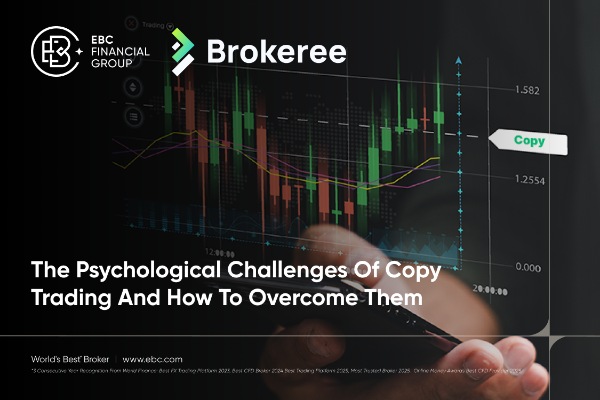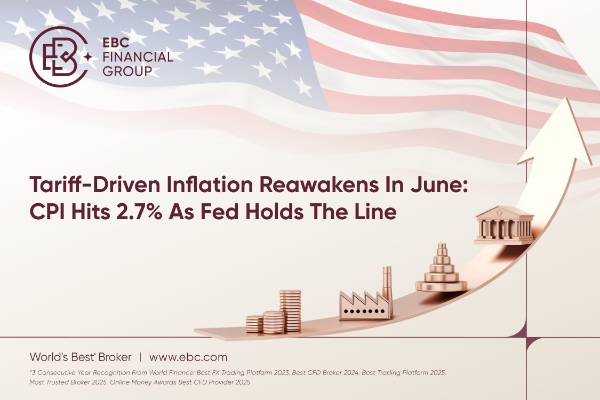Moody's recent decision to downgrade the United States' long-standing Aaa
sovereign credit rating to Aa1 has drawn attention across global markets. While
the move aligns Moody's with earlier actions by S&P (2011) and Fitch (2023),
it nonetheless marks a significant moment: the removal of the U.S.'s final
top-tier rating.
As the dust settles, we at EBC Financial Group (EBC) offer a breakdown of the
immediate and structural implications for traders and institutional
investors.

Markets React, but Fundamentals Drive the Conversation
The downgrade was announced after U.S. markets closed on Friday, and Sunday
evening trading saw a brief dip across risk assets. However, U.S. equities and
other major instruments regained much of their ground by Monday's close.
According to David Barrett, CEO of EBC Financial Group (UK) Ltd, the market's
swift recovery suggests the downgrade was largely expected. "Moody's has long
been viewed as the outlier among the major ratings agencies. For many market
participants, the interest lay not in the downgrade itself, but in the timing of
the decision," Barrett said.
Safe Haven Flows in Focus: Dollar Slips, Gold Strengthens
In the wake of the downgrade, markets reacted with a familiar pattern: a
softer U.S. dollar and stronger demand for traditional safe havens. Gold prices
edged higher as investors reassessed the risk landscape, while the dollar
weakened modestly across several major currency pairs. Though short-lived, these
movements reflect a well-established market dynamic—credit-related uncertainty
often prompts rotation into assets perceived to offer stability.
We note that while the dollar remains structurally supported by U.S. yields
and economic resilience, any erosion of confidence in fiscal policy or
creditworthiness may lead to periodic bouts of dollar softness and upside
interest in commodities like gold.
Structural Concerns Highlighted by Moody's
Moody's cited a combination of persistent challenges underpinning its decision to lower the U.S. credit rating. These include the country's expanding fiscal deficit, rising interest payment obligations, the potential extension and enlargement of tax cuts, and continued political polarisation. While none of these issues are new, their cumulative weight—particularly in a high-rate environment—raises renewed questions about fiscal sustainability and long-term policy coherence.
"These are not new concerns," Barrett noted. "But when underlined by a rating
agency, they carry a renewed weight that markets will now have to consider more
closely."
While investors initially voiced concerns about potential ripple effects on
institutional bond holdings, regulatory changes following the 2011 downgrade
have largely exempted government debt from such triggers in many portfolios.
Bond Markets Offer a More Telling Signal
We observe that long-term U.S. bond yields—particularly the 30-year—have
climbed back to levels last seen before key policy reversals in prior years.
"The bigger tell isn't just the rating change—it's in the bond market's
reaction," Barrett said. "If back-end yields continue to climb, it may become
increasingly difficult for the U.S. administration to contain volatility,
especially in the absence of clear fiscal consolidation plans."
Implications Beyond the U.S.: Focus Shifts to Global Carry Trades
Beyond the U.S., we highlight developments in Japan, where long-term bond
yields have reached 40-year highs, prompting renewed scrutiny of the country's
fiscal position. As noted in a previous feature with The Japan Times, Barrett
discussed how shifts in Japan's bond market could influence global carry trade
dynamics—particularly given the scale of capital that has flowed from Japan into
higher-yielding assets abroad. With significant sovereign bond ownership
concentrated in the Bank of Japan, and growing attention on back-end yield
movements, Japanese bonds may increasingly come into focus alongside their U.S.
counterparts.
We remain committed to equipping traders with timely insights and analysis to
navigate evolving macroeconomic trends with confidence.
Disclaimer: This material is for general information purposes only and is not
intended as (and should not be considered to be) financial, investment or other
advice on which reliance should be placed. No opinion given in the material
constitutes a recommendation by EBC or the author that any particular
investment, security, transaction or investment strategy is suitable for any
specific person.







